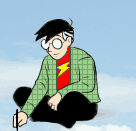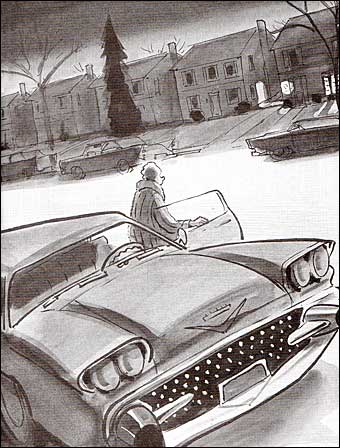Four to Watch Out For
Just had the pleasure (via Bob Weil at Norton) of devouring an advance copy of illustrator David Small’s Stitches: A Memoir due out this fall. Get it and read it when the time comes, it’s strong stuff. Small comes to comics via children’s books, but he’s deadly serious about the form, and exploits it masterfully to paint an unforgettable picture of his harrowing childhood.
There are some amazing books on their way in the next several months. David Mazzucchelli’s Asterios Polyp is imminent (just assuming that one’s amazing like everyone else—poor David) and I recently got advance peeks at Hope Larson‘s Mercury and Vera Brosgol‘s in-progress GN for First Second, both of which are the best work to date from these two powerful cartoonists.
Comics is changing. Behind the drawing table, people who would have been content splashing about in other fields a decade ago are swimming to comics’ deep end without even taking a breath. And on the drawing table, there’s a growing understanding of comics’ power to relate emotion, POV, and the warp and weave of memory. The compact, literal, rat-a-tat of post-Kirby mainstream storytelling that I started out reading is finally giving away to something far deeper, stranger, and potentially more beautiful.
Comics may not have its Beethoven yet, but he/she might just be reading this stuff in a year or two, between Math and Social Studies, and realizing for the first time just what they want to do when they grow up.















I’m not sure how useful it is to use language such as “Comics may not have its Beethoven yet,” but, as always, Scott, I commend your patronage of comics and look forward to these new works.
Re “Beethoven”: Just my way of saying that I hope this isn’t as good as it gets. Everything will eventually be seen as prelude to something else. I’d rather this be a long slope up, rather than the rise before a cliff.
I, too, am excited by and hopeful for the evolution of the form. We’ve seen great things and we’re sure to see more. Still, I’ve heard my wife (a musician) speak of Tezuka’s BUDDHA in the same way she speaks of Beethoven’s Ninth Symphony.
Funny thing is, to me, Tezuka is Bach. 😉
Me too, Scott, but I write about video games and I too frequently hear the question “has gaming had its Citizen Kane moment?” It seems to me that questions which have hooks in other art forms like these ones do have a tendency to hinder discussion. Comics does resemble other media, for sure, but it’s best to approach it on its own terms, I feel. We don’t want to define it by comparison to film, I’m sure you’d agree.
Too late for me, I’m afraid.
I’m devoted to what makes comics unique (obsessed with it, in fact) but I’m always reaching over the fence for comparisons—especially when dealing with a possibility for comics that doesn’t yet have a name.
Interesting.
That doesn’t come through in your work – at least, not the little of it that I’ve read so far. I’m working through your “… Comics” series (and, admittedly, subconsciously subbing in “video games” every time you say “comics,” so I can’t say I practice what I preach to the letter), and I haven’t yet felt that any of your thinking was especially derivative from that of other media.
I guess BookScott is more of a purist than BlogScott. 😉
Heh, what a coincidence. I wrote a post about the issue of hyping new talent today. http://floatinglightbulb.blogspot.com/2009/05/kate-beaton.html
If I ever see someone under 50 being called “The Comics Beethoven” I am going to come back here and make an indignant remark. 🙂
I agree – the hope is that things can keep growing and changing. That we’ll stop saying “this is how it should be done,” and start seeing new stories to tell, and new ways to tell them.
Always great to see what you think is pushing the boundaries of the medium!
“there’s a growing understanding of comics’ power to relate emotion, POV, and the warp and weave of memory.”
That’s exactly why I’m drawn to read, write, and draw comics.
I think that the big advantage that comics have in terms of memory is the flexibility to leave so much unsaid, while the words can carry what cannot be drawn.
Plus, as you’ve mentioned before, comics are all about time manipulation, which makes them a perfect match for memory (which is also all about time manipulation).
yah……”–weave of memory” like Blankets (maybe a little too late to count as part of the comic change…….)….I’m trying to imagine the day when most people consider comics literature just as much as novels and books.
wait a minute,POV?Is that Point of View?Excuseth mineth ignorance.
Oh, sorry. Yeah, Point of view.
I’m really interested in the way artists are thinking about framing as a way to engage the reader as a participant in the action. The image at top by David Small is a good example of an unusual “camera angle” that changes our sense of the scene and our place in it.
[…] “Comics is changing. Behind the drawing table, people who would have been content splashing about in other fields a decade ago are swimming to comics’ deep end without even taking a breath. And on the drawing table, there’s a growing understanding of comics’ power to relate emotion, POV, and the warp and weave of memory. The compact, literal, rat-a-tat of post-Kirby mainstream storytelling that I started out reading is finally giving away to something far deeper, stranger, and potentially more beautiful.” – Scott McCloud […]
Oh lord, the prospect of a full-length work from Vera Brosgol has me all a-quiver. She’s the best.